
Doctor ‘Stunned’ as Apple’s MagSafe Deactivates Cardiac Implant in Test

According to an experiment conducted by cardiologist Gurjit Singh, M.D., and his colleagues out of the Henry Ford Heart & Vascular Institute, the magnets that facilitate the iPhone 12’s MagSafe tech can deactivate implantable cardiac devices and disrupt their function in close proximity (via WEYI).
Dr. Singh, an expert in cardiac electrophysiology (which deals with various electrical and rhythm disorders of the heart), has intimate knowledge of implantable devices like defibrillators and pacemakers.
These devices, once implanted, cannot be physically tinkered with. That being the case, they have built-in switches that respond to powerful external magnets and can be used to change how the devices operate.
For example, a magnet can be used to disable an implanted defibrillator, and contact with an exceptionally strong magnet can result in a pacemaker delivering potentially harmful electrical pulses to the host’s heart.
“We began to wonder if the magnet in the iPhone 12 would affect the safe operation of these devices”, said Dr. Singh.
In order to test their hypothesis, Dr. Singh and his colleagues passed an iPhone 12 Pro over the chest of a patient with an implanted defibrillator. In close enough proximity with the defibrillator, the iPhone 12’s magnets caused it to deactivate.
“We saw on the external defibrillator programmer that the functions of the device were suspended and remained suspended. When we took the phone away from the patient’s chest, the defibrillator immediately returned to its normal function.”
“We were all stunned”, added Dr. Singh. “We had assumed that the magnet would be too weak in a phone to trip the defibrillator’s magnetic switch. “
Dr. Singh and his colleagues from the Henry Ford Institute published a manuscript detailing their findings in medical journal HeartRhythm on January 4, 2021.
Apple is well-aware that its MagSafe-enabled devices can interfere with the operations of medical implants, and advises users to keep them a safe distance away.
How MagSafe tech affects the functions of an implantable pacemaker, if it does so at all, currently remains unknown.
“We believe our findings have profound implications on a large scale for the people who live daily with these devices, who without thinking, will place their phone in their shirt pocket or upper pocket or their coat – not knowing that it can cause their defibrillator or pacemaker to function in a way that could potentially be lethal.”
In the U.S. alone, over 300,000 people get cardiac implants each year. In addition, 25% of all phones sold in the U.S. last year were members of the iPhone 12 lineup, all of which are equipped with Apple’s MagSafe tech.

